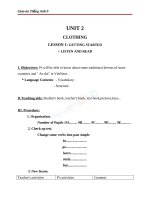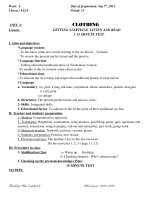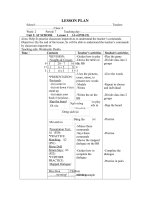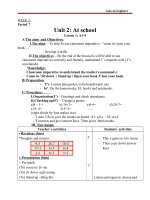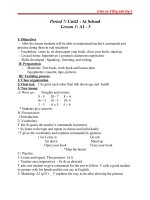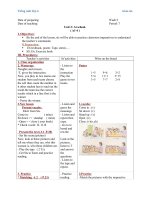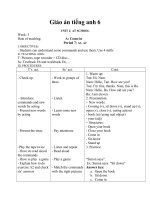Giáo án Tiếng Anh 9 Unit 2: Clothing
Bạn đang xem bản rút gọn của tài liệu. Xem và tải ngay bản đầy đủ của tài liệu tại đây (150.05 KB, 18 trang )
Giáo án Tiếng Anh 9
UNIT 2: CLOTHING
I. General objectives:
1. Competencies:
- Ask and answer about habits and personal taste of dreading.
- How to present personal ideas in written form about the simple.
- Problems referred to the topic using the readily-given prompts.
2. Language focus:
- The present perfect tense.
- Passive voice review.
II. Techniques:
Brainstorming; Questions – answers.
III. Teaching aids:
Cassette; Cassette recorder; illustrating picture; OPH; Picture; Visual aids; Laptop;
Flash cards; colored chalk.
IV. Total period distribution: 6 periods.
Period distribution
1
2
3
4
5
6
Items of Teaching
Getting started, Listen and read
Speaks
Listen
Read
Write
Language focus
Lesson 1: Getting started – Listen and read (45min)
I. Objectives:
- Introduce, leading to the topic of a unit: The traditional Ao Dai of Vietnam
- Remind them of some countries the word with their customs.
II. Grammar: The present perfect tense.
III. Vocabulary: word relating to ways of dressings.
Steps
Teacher’s activities
•
Getting started (15’)
Student’s activities
- Showing 6 pictures of people with - Looking at the 6 pictures and
their costumes.
guessing what countries they are.
- Eliciting the name of some countries.
- Asking them some questions.
Warm-up
1. Where does she come from?
- Answering the questions.
2. Why do you know she come from - Discussing in groups.
* Sample Key:
Japan?
- Teaching new words; a kimono; a 1. She comes from Japan
2. She comes from Vietnam
sari; a veil.
- Calling some group reprentatives to 3. He comes from Scotland.
answer in front of the class.
4. She comes from India.
5. He comes from the USA.
6. She comes from (Saudi) Arabia.
-
- Correcting their mistakes if possible.
Listening
explanations
to
the
then
teacher’s
wire
vocabulary down.
•
Listen and read (30’)
- Introducing the situation of the
passage.
“ Ao dai is the traditionally unique dress
- Listening to the teacher.
the
of Vietnam. They are being used by
both man and woman in specific
occasions. It has now being changed in
different designs for fashion.”
Leas-in
(30’)
Playing cassette once the - Listening to cassette.
1st paragraph.
-
Asking them questions:
1.
What is Ao Dai?
2.
What
are
women
- Answering the question.
do
nowadays?
3.
What do
women also
prefer?
4.
What do the designer do
to the Ao Dai?
- Having them a silent reading then - Having a silent reading
identifing the main idea of the passage.
- Playing cassette again.
- Explaining the new difficult words; - Listening to the cassette.
“poet’ mention; consist; of; to slit; - Writing down the new words
inspiration;
unique;
convenient;
along silk tunic; ethnic minoritres”
- Reminding them of new and old
structures:
- Finding out structures.
1. Old Structure: Past habit
2. Used to + V
Eg: Lan used to walk past the mosque
on her way to primary school.
3. New structure:
Wish sentence: Present unreal wish
- Identifying new structure.
Eg: I wish I had more time
- Asking them to have silent reading for - Having silent reading and get
information to answer the questions.
more information.
- Calling some students to say their
choices.
- Briefly explaining the used of wish.
- Saying the choices.
=> I wish I had more time.
I wish + clause (Past simple)
Practice:
1. I don’t have enough money.
I wish …………………………
- Doing the practice
2. I can’t sing that song.
1. I wish I had enough money
I wish …………………………
3. It’s raining.
2. I wish I could sing that song
I wish …………………………
4. I am too fat.
3. I wish it’s wasn’t raining
I wish …………………………
5. The weather is bad today
4. I wish I weren’t too fat
I wish …………………………
5. I wish the weather were fine
today.
Consolidatio
- The present perfect tense.
n
Home work
- Traditions in some countries.
- Completing the sentences and
answer the questions. (Page 14)
UNIT 2: CLOTHING
Lesson 2: Speak (45 min)
I. Objectives:
1. Competencies:
- Develop speaking skill.
- Ask & answer about the hobby and the habits of dressing.
2. Language focus:
a. Grammar:
- The Simple Present Tense
- The Simple Past Tense
b. Vocabulary:
- A colorful T-shirt; a plaid skirt; a plain suit; a short-sleeved; blouse; a sleeveless
sweater; a striped shirt; baggy pants; faded jeans; blue shorts.
II. Techniques:
Brainstorming; questions – answers; guessing
III. Teaching aids:
Cassette; cassette recorder; illustrating pictures; ohp; pictures; visual aids; laptop;
flashcards; colored chalk.
IV. Teaching steps:
Steps
Warm – Up
Teacher’s activities
- Asking students to answer some -
Presentation
questions about clothes:
1. What type of clothing do you wear
Student’s activities
Listening to the teacher’s
questions and answer.
at school?
2. What’s this? It’s a skirt / a blouse
…
Pre-speaking
- Introducing some new words referred - Looking at the new words and
to kinds of clothiers.
repeats after the teacher.
- Asking some questions:
- Learning the new vocabularies.
1. What do you usually wear on the - Answering the questions in pairs.
weekends?
2. Why are you wearing these clothes?
3. What is your favorite type of
clothing? Why?
4. School uniform: is it comfortable?
5. What color is it?
- Matching thru picture with the
- Asking them to match the pictures the words.
given words.
* Key:
a. A sleeveless sweater (5)
b. A striped shirt (6)
c. A plain suit (3)
d. Faded jeans (8)
e. A short-sleeved
f. A blouse
g. Baggy pants (7)
h. A plaid skirt (2)
i. Blue shorts (9)
Practice
Whilespeaking
- Letting the students to ask each other - SS ask the members of the other
in groups about their habit of dressings.
group about the clothes they wear
- Correcting their mistakes in spelling.
on the weekend.
- Calling some groups to present their
Controlled
interview before class.
- Presetting their interview before
practice
class.
Reproduction - Asking the students to answer the - Answering the questions.
questions :
Postspeaking
1. What type of clothing do you wear on
tet holiday?
2. What would you wear to a party?
- Asking them to summarize what kind - Summarizing the habit of dressing
of clothes they usually wear at school, at on special occasion.
the party or on Tet holidays.
Consolidatio
- Making up another conversation
n
between you and your friend referred to
the habits of dressing on special
occasion.
- Reminding them the questions “What
is your favorite type of clothing?”
Homework
- Doing exercise 3, 4 workbook
(page 14.15)
- Explaining the way how to do the
exercises.
UNIT 2: CLOTHING
Lesson 3: Listen (45 min)
I. Objectives:
1. Competencies:
- Developing reading skills.
- Listening for realistic information about some event.
2. Language focus:
a. Grammar:
Passive construction of past simple.
b. Vocabulary:
Attention; special; announce; entrance; wear; long-sleeved blouse; information
desk.
II. Techniques:
Brainstorming; Questions – answers; guessing.
III. Teaching aids:
Cassette; Cassette recorder; illustrating pictures; OHP; Pictures; Laptop; Flash
cards; colored chalk.
IV. Teaching steps:
Steps
Warm – Up
Teacher’s activities
Student’s activities
- Introducing the pictures divided into - Looking at the pictures and
Presentation
three groups of different clothes.
discuss their names on groups.
- Asking them some questions to remind - Answering the questions.
Pre-speaking
them the vocabulary questions:
1. What do you call these clothes in - VOC: trousers; shorts; skirt;
English?
blouse; sandals; shoes; boots
2. Have you ever worn them?
- Yes, we have
- Introducing the situation of the coming - Listening to the situation.
announcement.
- Listening, and then catching up
“Mary, a three-year-old girl is reported with the necessary information.
missing at the Car Fair”
- Asking them to listen and catch up
with the information “What is Mary
Whilelistening
wearing?”
- Playing cassette twice without pause.
- Listening to the cassette.
- Letting them guess in pairs “What is - Doing pair work.
Mary wearing?”, then compare with the - Marking the pictures.
pictures.
- Listening again.
- Marking the correct pictures.
- Making a good choice.
- Play cassette again.
* Tape script:
- Letting them make a good choice.
Attention please. Here is a special
announcement. A little girl is
reported missing. She was last seen
20 minutes ago near the main
entrance to the Car Fair. Her
name’s Mary and she are 3 year
old. She has short dark hair. She is
wearing shorts-blue shorts and a
long-sleeved white blouse. She’s
wearing a pair of shoes – brown
shoes. She may be carrying a large
doll.
If you see Mary, please bring
her to the information desk. Her
father’s waiting for her there.
Thank you.
Post-listening - Asking the students to compare their - Comparing their choice with
choices with partner.
partner.
- Calling some students to give the - Saying the choices before class.
answer.
- Listening to the key and correct.
- Giving them the key
* KEY:
1. She’s wearing blue shorts.
2. She’s wearing a long-sleeved
white blouse.
3. She’s wearing brown shoes.
Consolidatio
n
- Repeating the words referred to clothes
by looking at the pictures.
- Reminding them the passive structure.
Homework
- Doing exercise 5, 6 workbook
(page 16,17)
- Explaining the way how to do the
exercises.
UNIT 2: CLOTHING
Lesson 4: Read (45 min)
I. Objectives:
1. Competencies:
- Developing reading skill.
- Searching for information about the history of the development of jeans.
2. Language focus:
a. Vocabulary: words related to the history of jeans: sailor; embroidered jeans;
label; generation worldwide.
b. Grammar: passive voice (past simple).
II. Techniques:
Scanning; Questions – answers; guessing.
III. Teaching aids:
Map; cassette; Cassette recorder; illustrating pictures; OHP; Pictures; Laptop;
Flash cards; colored chalk; visual aids.
IV. Teaching steps:
Steps
Warm – Up
Teacher’s activities
- Introducing the new reading by asking -
Presentation
some questions:
1. Do you know jeans?
Student’s activities
Listening to the teacher’s
introduction.
- Answering the questions freely.
2. Do you like wearing jeans?
3. Who loves wearing jeans?
4. When did jeans appear for the first
Pre-speaking
time?
- Encouraging the students make some - Making questions randomly.
questions about jeans:
“What do you want about jeans?”
question for elicit.
- Having scanning: (task 1)
- Reading quickly to find down the new - Reading the passage for missing
While-
words and the information (page 17)
- Introduction some vocabularies.
information.
- Listening to the teacher to know
reading
- Asking the students to have a silent the moaning of new words.
reading to do the gap filling A.
- Having a silent reading
- Playing cassette twice.
- Doing gap filling.
- Calling some students to read the text - Listening to the cassette.
aloud.
- Reading the text aloud.
- Task 2: asking the students to do task - Doing talk B in pairs.
B in pairs.
- Lestening to the cassette.
- Reading the text aloud.
- Doing taks B in pairs.
Post-listening - Calling some students to answer the - Listening to the keys.
questions before class.
- Correcting their answers.
- Correcting their answers by giving
Consolidatio
them key.
Do you like wearing Jeans?
n
Where do jeans come from?
Who are now often wearing Jeans?
Why?
Homework
- Doing exercise 8, 9 workbook
(page 18,19)
UNIT 2: CLOTHING
Lesson 5: Write (45 min)
I. Objectives:
1. Competencies:
- Developing writing skill.
- Know how to write a paragraph about the secondary school student’s wear.
2. Language focus:
a. Grammar:
The simple present tense.
b. Vocabulary:
Be equal in; be pound of; bear one’s name; freedom of choose; self-confident; feel
comfortable.
II. Techniques:
Questions – answers; guessing.
III. Teaching aids:
Sample form of a letter; OHP; Pictures; Laptop; Flash cards; colored chalk; visual
aids.
IV. Teaching steps:
Steps
Teacher’s activities
Student’s activities
Warm – Up - Introducing the table showing the three - Looking at the table then discuss
Pre-writing
parts
of
showing
something
or
appropriate
argumentative
(page 18)
a
comments
problem
on in pairs.
using -
the
appropriate
language argumentative language.
- Reading the topic and outline a
- Asking the students to read the topic and
Pre-speaking
Identifying
the
model
passage,
and outline A and the model passage highlight the sequence words.
the
supporting the idea that secondary
students should wear uniforms…
- Asking them some questions:
- Answering the questions.
1. “What type of clothing do you wear
at school?” (White shirt and trousers).
2. Why do they wear uniform at school?
- Explaining some new words (be equal
in, be proud of, bear one’s name, - Listening to the explanations,
freedom of choice, self-confident)
While-
- Letting them read the outline B.
- Reading outlines B.
reading
- Giving them the meaning of some - Knowing the meaning of some
words: feel comfortable, freedom of difficult words.
choice.
- Asking them discuss in groups outline - Discussing in groups outline B
B then write down their ideas.
then do the draft of the second
passage.
- Asking some students to write their - Writing down their ideas in
Post-writing
Consolidatio
n
ideas on the board.
written forms.
- Correcting the mistakes.
- Correcting the mistakes
- Giving them suggested writing (see at
- Writing down the suggested
the end of lesson plan).
passage.
“Why should the secondary students
wear uniforms?”
Remind them the argumentative
language?
Homework
- Doing exercise 8, 9 workbook
(page 18,19)
- Explaining the way how to do the
exercises.
SUGGESTED WRITING:
My opinion is that secondary school students should wear casual clothes.
Firstly, casual clothes make students feel comfortable.
Secondly, wearing casual clothes gives students freedom of choice. They are
rights to choose sizes, colors and fashions of clothes that they love.
Thirdly, casual clothes make students feel self-confident when they are in their
favorite clothes.
Finally, casual clothes make students more colorful and lively.
In conclusion, secondary students should wear casual clothes. Wearing casual
clothes is convenient, comfortable and fun.
SEQUENCE:
Introduction
Organization
Argumentative language
- Let the reader know the writer’s point - My opinion is…………………….
of view.
Series of
arguments
I think ……………………………..
- Presents arguments in a logical way Firstly………………………………
(one idea in each paragraph) give Secondly……………………….
examples where possible.
Thirdly ………………………….
Finally/Lastly…………………….
Conclusion
- Sums up the argument
There ………………………….
In conclusion…………………..
UNIT 2: CLOTHING
Lesson 6: Language focus (45 min)
I. Objectives:
1. Competencies:
- Reminding them of previous knowledge on present perfect and the passive voice
- Know how to used specific words of present perfect.
2. Language focus:
a. Present perfect tense with specific words: (since, for, ever, already, yet,…)
b. Review passive voice with tenses:
- Present simple, Past Simple, Future Simple, Present perfect and modal verb
passive.
II. Techniques:
Questions – answers; guessing.
III. Teaching aids:
Pictures; Laptop; Flash cards; colored chalk; visual aids.
IV. Teaching steps:
Steps
Present perfect
SINCE & FOR
Teacher’s activities
Student’s activities
with - Letting the students read the model - Reading the model dialogue.
dialogue.
* Since: before a certain point of time.
Leading
- Underlining the substitution
them
to
underline words or phrases.
substitution words or phrases.
- Answering the questions.
Eg: since 2 o’clock/ last - From the underline substitution,
week/ last month/ last asking them to reproduce the similar - Practicing the dialogue in pairs.
year.
dialogues using the given word from
* For: before duration the box.
of time.
- Asking them to practice the
Eg: for 2 hours/ two dialogue in pairs.
weeks/ three years…
Consolidation
- What is WISH Sentence?
- What tense is used in wish 1st type?
- Remind them the structure of
passive voice.
Homework
- Doing exercise 7 (page 10).
- Explaining the way how to do
the exercise.
